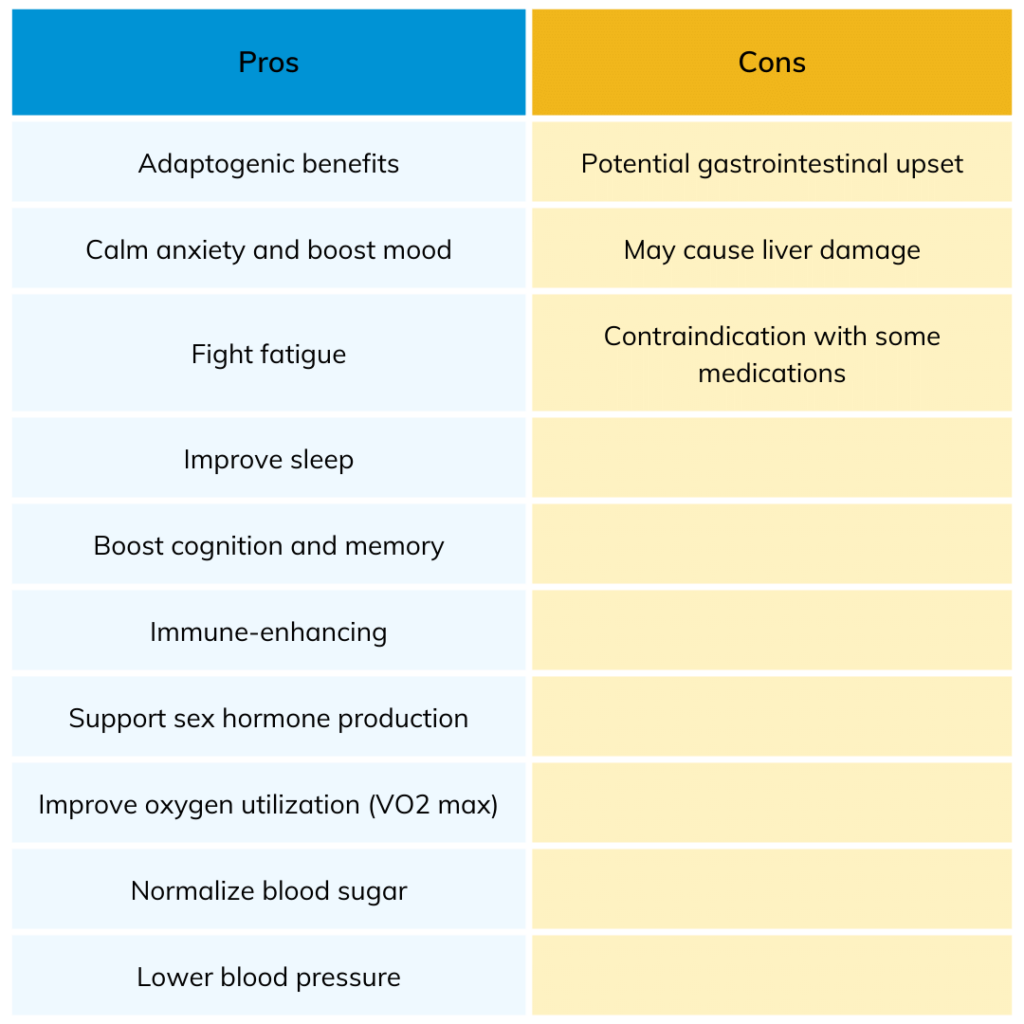Ashwagandha is a popular ingredient in Ayurveda as well as in homeopathy. It is considered a powerful herb with an extensive range of benefits. Originally native to India, this herb has made its way into the Western health scene and is now grown worldwide. While Ashwagandha supplementation is often raved about, few people tell you the whole story and include all of its effects. Keep reading for an extensive exploration of the Ashwagandha pros and cons.
Ashwagandha Pros
Stress Management
Ashwagandha is regarded as an adaptogen, meaning that it helps the body to maintain homeostasis in the face of both physical and mental stress (1). Adaptogens create a unique effect in which they both calm the body and improve energy levels. These effects are also believed to help explain why Ashwagandha can help to improve sleep quality (1).
Mood Regulation
In addition to affecting decreasing anxiety and boosting mood, Ashwagandha is believed to have other cognitive benefits. It has demonstrated the ability to help sustain attention, prevent mental fatigue, and improve working memory (2). Ashwagandha’s cognitive benefits have been observed in a study in which supplementation improved memory, executive function, attention, and information processing in individuals with early dementia (3).
Immune Support
Ashwagandha has also demonstrated immunomodulatory effects (4). One study showed that it improved the immune system in healthy individuals by increasing immunoglobulins and other immune cells (4).
Hormonal Support
Research has shown that Ashwagandha supports reproductive function (5, 6). In men, this is likely due to its positive effect on testosterone levels (5). For women, Ashwagandha seems to support estrogen levels which can help to improve fertility or relieve menopause symptoms (6, 7).
Cardiovascular Health
Ashwagandha may benefit cardiovascular health, including oxygen metabolism, blood pressure, and blood sugar. A study performed on athletic adults saw an improvement in VO2 max as a result of Ashwagandha supplementation (8). (VO2 max is a measure of how well the body utilizes oxygen and considered an indicator of cardiovascular fitness.) Additionally, because of its effects on cortisol levels, Ashwagandha may exhibit a blood-pressure lowering effect (9). Lastly, Ashwagandha leaf contains withanolides which are compounds that improve insulin activity and can help to normalize blood sugar (10).
>>>Take advantage of this special offer for 10% off Approved Science® Ashwagandha!
Ashwagandha Cons
Large quantities of Ashwagandha may cause gastrointestinal upset in some individuals.
A small case study that followed 5 individuals found that liver injury developed following Ashwagandha supplementation (11). After stopping Ashwagandha supplementation, their liver scores normalized within 1-5 months (11). Overall, liver damage from Ashwagandha is rare (12). However, if you suspect that you may be experiencing this side effect, then you should consult your doctor.
In some cases, Ashwagandha may cause contraindications with medications. As with any supplement, you should consult with your doctor before adding Ashwagandha into you diet, especially if you have a health condition or take medications.

Ashwagandha Pros And Cons: Bottom Line
The pros of taking Ashwagandha far outweigh the cons. Side effects from Ashwagandha are rare, but they do exist. Therefore, the decision to take Ashwagandha or a different supplement is personal and depends on your health condition. Because each body is different, it’s important to always seek the advice of a trained professional who has the necessary information to guide you on your health care journey. If you’ve been given the green light to take this herb, I recommend Approved Science® Ashwagandha.

Approved Science® Ashwagandha is formulated with 1500 mg of Ashwagandha per daily dosage. It also contains 10 mg of Ginger which increases the health benefits that this product can deliver. To enhance overall efficacy, Approved Science® Ashwagandha includes 10 mg of BioPerine, which is a black pepper extract that helps to increase nutrient absorption.

